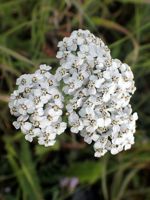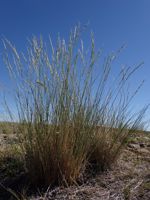Mon-Fri 9am - 5pm Mountain time
Yarrow vs Bluebunch Wheatgrass
Achillea borealis (Previously Achillea millefolium)
Pseudoroegneria spicata (Agropyron spicatum)
SOLD OUT
CUSTOM GROW
Yarrow is a herbaceous, native wildflower that is found across Canada. It features large, flat clusters of tiny white flowers. The blooms attract a variety of pollinators, making it an ideal choice for pollinator gardens. While partial shade is tolerated, the best flowering occurs in full sun. Yarrow is resistant to deer and rabbits, making it both a beautiful and practical addition to your landscape.
The entire plant is edible, but leaves and flowers are most commonly consumed. They have a strong licorice scent and a mild sweet flavor that is similar to tarragon. Yarrow leaves can also be used as a natural insect repellent.
It is important to plant Yarrow in the right place, it can spread quickly via both rhizomes and self-seeding. Deadheading the spent flowers will extend the bloom season and can help limit self-seeding.
Bluebunch Wheatgrass is a native perennial bunchgrass common across prairies, foothills, and open woodlands. Longer-lived than many other grass species, it develops deep, fibrous roots that stabilize soils and make it drought-tolerant once established. It is a cool-season grass, growing most actively in spring and fall and slowing during the heat of summer.
This hardy grass provides excellent forage for deer, elk, and bighorn sheep, and is especially palatable to livestock. Its seeds feed birds and small mammals, while its bunching growth offers protective cover for ground-nesting birds such as sparrows and sage-grouse, as well as shelter for small mammals. Bluebunch Wheatgrass is well-suited to rangeland & prairie restoration, naturalization, and erosion control projects.
Yarrow Quick Facts
Bluebunch Wheatgrass Quick Facts
Toxicity: toxic to dogs, cats, and horses

